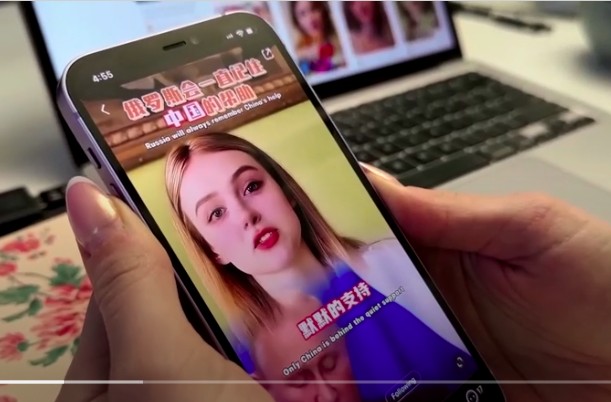In China, artificial intelligence has turned a Ukrainian YouTube vlogger into a Russian one
Deep-fake technology has become widespread in China and is used in advertising without any restrictions

Ukrainian Olga Loiek, a student at the University of Pennsylvania, was looking for fame online, and she found it – but in an unexpected way. After launching her YouTube channel in November last year, the 21-year-old discovered that her image had been processed using artificial intelligence to create fake identities on Chinese social media platforms.
Source. This was reported by Reuters.
Her digital doubles with names like "Natasha" claimed to be Russian women who were fluent in Chinese and wanted to thank China for supporting Russia and earn some money by selling goods such as Russian candy.
What's more, the fake accounts had hundreds of thousands of followers in China – far more than Loek herself.
"It literally looks like my face is speaking Chinese, and in the background I see the Kremlin and Moscow, and I'm kind of talking about how great Russia and China are," Loiek told Reuters.
"It's really creepy because these are things I would never say in my life," she stressed.
Loiek's case is not the only one. There is a growing number of seemingly Russian women on Chinese social media who demonstrate their love for China in fluent Chinese and say they want to support Russia in the war by selling products from their homeland.
However, these people do not exist. Experts say they were created by artificial intelligence by misappropriating videos of real women found on the Internet, often without their knowledge. And the fake videos are used to advertise products to unmarried Chinese men, experts say.
Accounts created with Loiek's image have hundreds of thousands of followers and sell products worth tens of thousands of dollars, including candy. Some of the posts contain warnings that they could have been created with the help of artificial intelligence, some do not.
The creators of these accounts are using the Russia-China "borderless" partnership proclaimed by Putin before the February 2022 invasion of Ukraine to increase sales of imports from Russia.
Jim Chai, chief executive of XMOV, an artificial intelligence company that is not involved in the Olga Loek situation, says the technology to create such images is "very common because many people use it in China.
"For example, to create my own 2D digital person, I just need to make a 30-minute video of myself, and then I re-edit the video. Of course, it looks very real, and of course, if you change the language, the only thing you need to adjust is the lip sync," said Chai.
Artificial intelligence is a hotly debated topic, and Loek's story sheds light on the risks of its potentially illegal or unethical use as these powerful tools for creating and distributing content become commonplace around the world.
In January, China published draft guidelines for the standardisation of the AI industry, proposing to create more than 50 national and industry standards by 2026.
However, Xin Dai, an associate professor at Peking University Law School, notes that regulation is far behind the pace of AI development.
"I think the critical thing here is that the volume is just too big, not only in China but also on the general Internet around the world," he says.
Background. Read more about why McDonald's is scaling down the experiment with ordering due to AI errors and other high-profile cases of its application in Mind's article "Amazon, Uber, Spotify, JP Morgan, Netflix, Tesla, and more: Successful and failed cases of artificial intelligence".
If you have read this article to the end, we hope that means it was useful for you.
We work to ensure that our journalistic and analytical work is of high quality, and we strive to perform it as competently as possible. This also requires financial independence. Support us for only UAH 196 per month.
Become a Mind subscriber for just USD 5 per month and support the development of independent business journalism!
You can unsubscribe at any time in your LIQPAY account or by sending us an email: [email protected]



